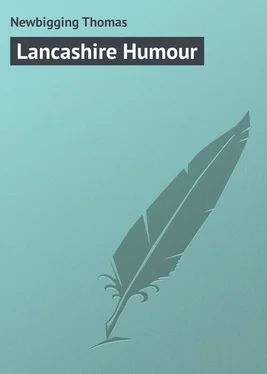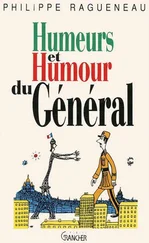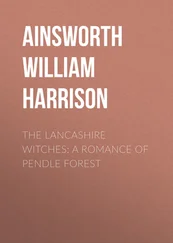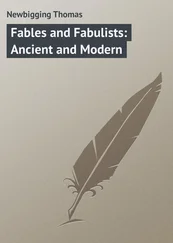Thomas Newbigging - Lancashire Humour
Здесь есть возможность читать онлайн «Thomas Newbigging - Lancashire Humour» — ознакомительный отрывок электронной книги совершенно бесплатно, а после прочтения отрывка купить полную версию. В некоторых случаях можно слушать аудио, скачать через торрент в формате fb2 и присутствует краткое содержание. Жанр: foreign_prose, foreign_humor, на английском языке. Описание произведения, (предисловие) а так же отзывы посетителей доступны на портале библиотеки ЛибКат.
- Название:Lancashire Humour
- Автор:
- Жанр:
- Год:неизвестен
- ISBN:нет данных
- Рейтинг книги:5 / 5. Голосов: 1
-
Избранное:Добавить в избранное
- Отзывы:
-
Ваша оценка:
- 100
- 1
- 2
- 3
- 4
- 5
Lancashire Humour: краткое содержание, описание и аннотация
Предлагаем к чтению аннотацию, описание, краткое содержание или предисловие (зависит от того, что написал сам автор книги «Lancashire Humour»). Если вы не нашли необходимую информацию о книге — напишите в комментариях, мы постараемся отыскать её.
Lancashire Humour — читать онлайн ознакомительный отрывок
Ниже представлен текст книги, разбитый по страницам. Система сохранения места последней прочитанной страницы, позволяет с удобством читать онлайн бесплатно книгу «Lancashire Humour», без необходимости каждый раз заново искать на чём Вы остановились. Поставьте закладку, и сможете в любой момент перейти на страницу, на которой закончили чтение.
Интервал:
Закладка:
Some years ago I attended a meeting held at Blackley where Ben gave a number of racy Lancashire anecdotes, told in his own inimitable way. I may quote one or two of these which are not given in the collected edition of his writings.
"Long Jammie wur a brid stuffer, an' it used to be his boast ut he'd every fithert animal, or like it, ut ever flew on wing, or hung on a wall. He'd everything fro' a hummabee to a flying jackass, an' he'd ha' a pair o' thoose last if Billy o' Bobs would alleaw hissel' to be stuffed."
"Theau'rt one thing short," Billy said one day as he're looking reaund Jammie's Musaum, as he co'd his collection.
"What's that?" Jammie ax'd.
"It's a very skase brid," Billy said, "Co'd a sond brid."
"Ay, it mun be skase or else I should ha' had a speciment i' my musaum," Jammie said. "But what is it like?"
"It's like o' th' bit-bat gender," Billy said. "It's a yead like a cat, and feet like a duck, an' when it flies it uses its feet like paddles to guide itsel'."
"But why dun they co' it a sond brid?"
"Well, theau sees, it's a native o' th' Great Desert o' Sara, an' when it's windy, it flies tail first to keep th' sond eaut o' its een."
Billy Kay had had a lot of his hens stown, an' he never could find eawt who th' thief wur. He'd set a trap, but someheaw it didno' act. Shus heaw, it never catch't nowt.
Bill had a parrot ut wur a bit gan to leavin' th' cage an' potterin' abeaut th' hencote when th' hens wur eaut. But as it had bin brought up to a soart o' alehouse life, it wanted company. It had learnt to crow so natural ut th' owd cock wur curious to know what breed it belonged to. So he invited Pol to spend a neet wi' him an' th' family, an' gie' th' cote a rooser. Th' parrot went, and they'd a merry time on't. It wur late when they went to roost, an' they'd hardly had a wink o' sleep when Pol yerd summat oppen th' cote dur. Then ther a hont lifted to the peearch, an' one after another o' th' hens wur snigged off, till it coome to th' owd cock. Pol thowt it wur gettin' warm, so hoo says to th' owd rooster, "Hutch up, owd lad, it's your turn next!" Ther no moore hens stown!
"Owd Neddy Fitton's Visit to the Earl o' Derby" is one of the finest sketches in the vernacular; giving, as it does, a realistic picture of the old-time Lancashire farmer. It is bright with humour, not wanting in pathetic touches, and with that warm human interest that lends charm and distinction to the homeliest story.
Miss Lahee, the writer, was Irish both by birth and up-bringing. Coming to Rochdale, where she lived for many years, the character of the Lancashire people and their idiom won her sympathy, and she studied both to such purpose as to produce not only the story in question, but a number of other sketches and stories in the dialect. It is no disparagement to these latter to say that none of them is equal to her sketch of "Neddy Fitton." This has long been popular in the county Palatine, and its intrinsic merit is such that it deserves a still wider circle of readers.
Lancashire has from time immemorial been famous for its mathematicians, botanists, and naturalists among the humbler ranks, and Crabtree as an Astronomer has his niche in the temple of fame. There was another worthy of rather a different stamp who professed acquaintance with that sublime science, Astronomy, though his credentials will hardly be considered sufficient to justify the claim. Jim Walton was a well-known character, at one time living at Levenshulme. Modest enough when sober, when he had imbibed a few glasses of beer Jim professed to be great in the mysteries of "ass-tronomy." The names of the planets, their positions and motions in the heavens were as familiar to him as the dominoes on the tap-room table, and he knew all the different groups of stars and their relative positions. One night Jim was drinking in the village "Pub" with a number of boon companions, topers like himself – and the conversation, as was usual when he was present, got on to the stars and other heavenly bodies, on which Jim expatiated at length. A mischievous doubt, however, was expressed by one of the company, whether, after all, Jim really knew as much about astronomy as he professed to do. So, to maintain his reputation by proving his knowledge, Jim made a bet of glasses round with his opponent that the moon would rise at a quarter past nine o'clock that night .
Accordingly, about ten minutes before the time named, the company all staggered out into the backyard to see the moon rise as predicted.
"Now then, chaps, look here!" cried Jim, "Let's have a fair understondin'. Recolect, it's on th' owd original moon 'at awm betting, noan o' yer d – d new ones!"
Needless to say this was a poser for their bemuddled brains, and with sundry expletives at Jim and the qualification he had announced, they all staggered back to their places in the more comfortable tap-room.
Jim's idea of "th' owd original moon," and his thorough contempt for quarter and half moons, strikes us as irresistibly funny. We can imagine the new, vague light that would dawn on the minds of the half-fuddled roysterers as he announced his reservation in favour of the whole or none.
However prejudiced, as a rule, the British workman may be against the introduction of labour-saving appliances in the way of automatic machinery, circumstances sometimes arise when he can fully appreciate their value and advantages. This will appear by the following characteristic anecdote: —
An Oldham chap, who, for some misdemeanour, had found his way into Preston House of Correction, was put on to the tread-mill. After working at it for some time till his back and legs ached with the unwonted exercise, he at length exclaimed:
"Biguy! if this devil had been i' Owdham, they'd a had it turned bi pawer afore now!"
Another good story of an "Owdham" man is the following: At one of the Old Trafford County Cricket matches we overheard a conversation that took place between two Owdhamers. A pickpocket, plying his avocation, had been caught in the act of taking a purse, and quite a commotion was created in that corner of the field as the thief was collared by a detective and hauled away to the police station. Says the Oldham man to his friend who was seated next him:
"Sharp as thoose chaps are, they'd have a job to ta' my brass. Aw'll tell thi what aw do, Jack, when aw comes to a place o' this sooart; aw sticks mi brass reet down at th' bottom o' mi treawsers pocket, and then aw puts abeaut hauf a pint o' nuts at top on't; it tae's some scrawpin out, aw can tell thi, when tha does that!"
Pigeon fancying and flying is an absorbing pursuit with many of the Wigan colliers. Men otherwise ignorant (save of their daily work in the mine), are profoundly versed in the different breeds and capabilities of the birds. The training of them to fly long distances on their return to their lofts and within a comparatively brief space of time, is a passion which absorbs all their thoughts.
One such enthusiastic pigeon flyer was lying sick unto death, with no prospect of recovery. The parson paid him a visit and endeavoured to turn his thoughts to his approaching end. The casual mention by the parson of heaven and the angels interested the dying man. He had seen angels depicted in the picture books with wings on their shoulders. An idea struck him and he enquired:
"Will aw ha' wings, parson, when aw get to heaven?"
"Yes, indeed," replied the parson, willing to humour and console him as best he might.
"An' will yo ha' wings too when yo get theer?"
"Oh yes, I'll have wings too, we'll both have wings."
"Well, aw tell thi what," said the dying pigeon fancier, his eye brightening as he spoke, "Aw tell thi what, parson, when tha comes up yon, aw'll flee yo for a sovereign!" A striking example of the ruling passion strong in death!
Читать дальшеИнтервал:
Закладка:
Похожие книги на «Lancashire Humour»
Представляем Вашему вниманию похожие книги на «Lancashire Humour» списком для выбора. Мы отобрали схожую по названию и смыслу литературу в надежде предоставить читателям больше вариантов отыскать новые, интересные, ещё непрочитанные произведения.
Обсуждение, отзывы о книге «Lancashire Humour» и просто собственные мнения читателей. Оставьте ваши комментарии, напишите, что Вы думаете о произведении, его смысле или главных героях. Укажите что конкретно понравилось, а что нет, и почему Вы так считаете.












